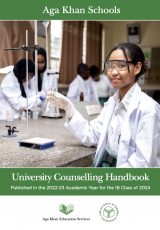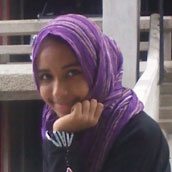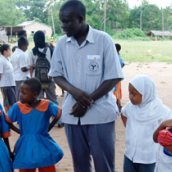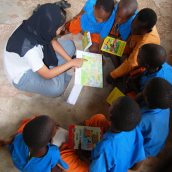AKA Mombasa’s transformative service programmes bring grassroots development into the classroom
“It helped me to understand that there’s so much to development…Poverty is broad. There is no one solution,” said Maina, who has since participated in AKF internships related to microfinance, education for marginalised children and community health.
Equipping students to become actors of social change
Maina was able to participate in these internships through an Academy service initiative that has built partnerships with local AKF projects to provide Diploma Programme (senior-level) students and alumni with opportunities to do service directly with grassroots development projects. Though this specific programme is aimed at senior-level students, the Academy provides students of all ages with a variety of community service activities through other initiatives.Summer internships, like the one in which Maina participated, were established in 2009 in Mombasa with the aim of realising the Academies’ vision of producing graduates who will be drivers of their society’s future development. In addition to contributing to the students’ growth and enabling them to fulfil the service requirement for the International Baccalaureate Diploma, the placements also aim to make meaningful contributions to the work of AKF.
“We wanted them to see reality outside the ‘bubble’ of the Academy. We also wanted to make them feel they have the skills and agency to do something,” said Nicole Nikolaidis, the Academies’ Student Leadership Coordinator.
For many AKA Mombasa students, the experience has been transformative.
“I became less interested in what the world had to offer [me and more interested in] what I had to offer the world,” said Khadija Dohry, a 2012 AKA Mombasa graduate, who is studying political science and international relations. She wants to become a diplomat and work for “the greater interest of [her] people.”Dohry’s outlook was shaped by her decision to volunteer at the Madrasa Resource Centre, Kenya (MRC,K), which provides early childhood education to poor Kenyans, for six weeks during the summer of 2011. She helped renovate a school playground and set up a mini library, in addition to organising an IT workshop to help teachers with their computer skills. As she got to know the community, she grew concerned about the high rate of girls who dropped out of school because of forced early marriages or pregnancy cases. This inspired her to establish forums in partnership with MRC,K and the Kenya School Improvement Programme that engaged the community in discussions about the downside of early marriage and the importance of setting educational milestones for children.
Proving that youth can make meaningful social impact
While development projects like MRC,K now welcome students like Dohry with open arms, there was some reluctance at first. When Nikolaidis set out to develop linkages with AKF, she faced many roadblocks.“It was a big challenge to sell,” Nikolaidis said. The AKF staff she approached initially doubted that high school students would make a big contribution, as their interns typically held a Bachelor of Arts or Bachelor of Science. At worst, they feared the interns would add to their workload. But six AKF projects agreed to test out seven-week placements with 17 Diploma Programme students during the summer of 2009.
In most cases, the students were thrown into the deep end. “We didn’t show them any mercy…and treated them like any programme officer,” one staff member said in an evaluation of the 2009 placements. Students found this expectation motivating. They drew on their enthusiasm, technical savvy and academic experience to write reports, conduct research, provide logistical and training support, prepare presentations and help staff with IT issues.
“Our perception of youth [and their abilities] is different now,” said Atrash Ali, the Project Director of East African Quality in Early Learning, after the first round of placements. “We got to see the potential that youth have, and we tend to ignore that…They have shown that they have a lot to offer at this age.”
In one case, students independently organised a project to repaint a rundown school. In another, they played a critical role in the development of reports for a government ministry. They also deepened their knowledge of their country. “I have learned that I am not aware of issues that are happening in my own town,” said Muzamil Mohammed, a 2009 graduate who volunteered for MRC,K.
“In school, they might talk about the Millennium Development Goals or the Human Development Index, but they see these issues first-hand through the placements. They’re able to connect real life with what they learn inside the classroom,” said Nikolaidis.
Preparing students to create and manage social development projects
Many students take what they learn through the placements a step further by developing an outreach project, which satisfies the creativity, activity, service (CAS) component of the International Baccalaureate Diploma through a long-term project that integrates at least two of the elements of creativity, activity and service.Two years ago, a group of students used the outreach project as an opportunity to contribute to the improvement of numeracy skills in local schools. After thinking about their own experience as students, as well as conducting research into teaching strategies, they produced a handbook of child-centred math activities. They then delivered a workshop to teachers, who implemented some of the activities in their classrooms.
“We try to ground students to think about socio-economic development when they think about their CAS projects,” Nikolaidis said. She added that the opportunity to link students with Aga Khan Development Network organisations through internships is an aim for all Academies. AKA Hyderabad just wrapped up its first series of summer placements, and Nikolaidis is currently in contact with local development programmes to build long-term opportunities for students. She hopes to impact more students like Maina.
“I’ve learned [through the programme] that development is about helping people to help themselves…Ultimately, I see myself in microfinance because I think it does this in a really inspiring way,” Maina said.
By Alia Dharssi
Newsletter readers please click here to return to the newsletter (browser version)
publications








